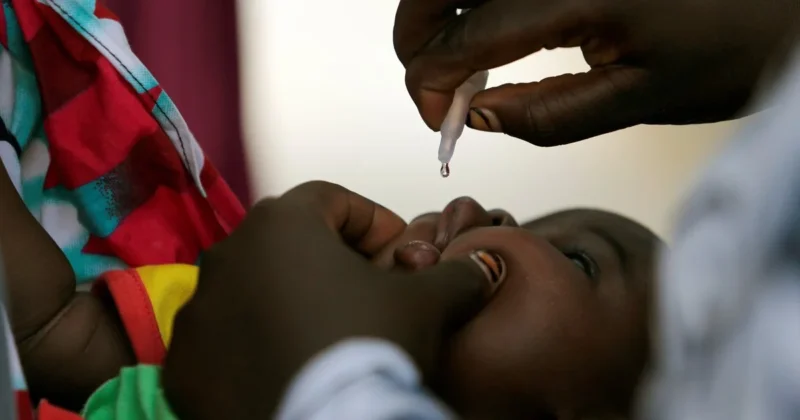UNICEF and Lagos State Government collaborate on an advocacy walk to address the alarming resurgence of polio linked to low immunization, poor sanitation, and malnutrition in Lagos
[dropcap]T[/dropcap]he United Nations Children’s Fund (UNICEF) has identified critical factors – low immunisation coverage, poor sanitation, and malnutrition as the primary drivers behind the concerning resurgence of polio and other vaccine preventable diseases in Lagos State.
Also read: UNICEF targets 3.8 million children for measles vaccination in Northern States
This alarming revelation was made during the 2025 World Immunisation Week Advocacy Walk for Polio, a collaborative effort between UNICEF and the Lagos State Government held today.
The impactful event saw the participation of prominent policymakers, community leaders, influencers, youth advocates, development partners, and numerous concerned citizens.
Together, they marched from the Office of the First Lady of Lagos State in Alausa to the Ministry of Education in Ikeja, demonstrating a united front against these preventable diseases.
Ms Celine Lafoucriere, Chief of the UNICEF Lagos Field Office, underscored the urgent need to tackle the existing gaps in routine immunisation.
She highlighted the global success of the oral polio vaccine in preventing an estimated 24 million cases of paralysis. However, she cautioned that the fight is far from over, particularly within Lagos State.
“Today, the oral polio vaccine has helped prevent 24 million cases of paralysis. But friends, we are not done yet. Right here in Lagos, we are detecting a resurgence of polio.
Low immunisation coverage, poor sanitation, and malnutrition are keeping the door open for polio and other vaccine-preventable diseases. Routine immunisation is our best bet,” Ms Lafoucriere stated emphatically.
She further stressed the critical importance of raising awareness and educating the public about the life-saving power of vaccines.
“Despite the fact that vaccines are powerful, proven life savers, some parts of the population remain misinformed, believing in harmful rumours.
Despite the increasing availability of vaccines, some communities only access them during campaigns. This is not sustainable! Routine immunisation must become the norm for every child born in Lagos,” she urged.
Right here in Lagos, we are detecting a resurgence of polio. Low immunisation coverage, poor sanitation, and malnutrition are keeping the door open for polio and other vaccine-preventable diseases. Routine immunisation is our best bet,” said Ms Celine Lafoucriere, Chief of the UNICEF Lagos Field Office.
Ms Lafoucriere reaffirmed UNICEF’s unwavering commitment to supporting the Lagos State Government in its efforts to reach the most vulnerable children with essential vaccines.
“UNICEF continues to stand with Lagos State and the Nigerian people to deliver vaccines to the hardest-to-reach children through vaccination campaigns, support health workers with training and resources, and build trust in every community so that no child is left behind,” she added.
The First Lady of Lagos State, Dr Claudiana Ibijoke Sanwo-Olu, passionately declared immunisation as a fundamental right, not a privilege.
She called upon all residents of Lagos to actively engage in the collective fight against vaccine-preventable diseases.
“The theme for this year’s World Immunisation Week, ‘Humanly Possible: Saving Lives Through Immunisation’, challenges us to ensure that no child suffers or dies from a disease we have the tools and knowledge to prevent,” Dr Sanwo-Olu asserted.
Dr Sanwo-Olu announced that Lagos State would participate in the National Immunisation Plus Days from Saturday, May 3rd to Tuesday, May 6th, 2025.
During this period, all children aged 0 to 59 months will receive two free drops of the oral polio vaccine. Vaccination teams will be strategically positioned at public health facilities and will also conduct house-to-house visits, covering schools, religious centres, markets, and other public spaces. “We ask all parents and guardians to cooperate fully. Your participation is crucial,” she appealed.
She also issued a strong warning against the dangers of misinformation surrounding vaccines. “Vaccines are safe, effective, and lifesaving.
We must combat vaccine hesitancy by promoting accurate information and building trust within our communities,” she emphasized.
The Deputy Governor’s wife, Mrs Oluremi Hamzat, encouraged all participants to become dedicated immunisation ambassadors, actively spreading awareness and encouraging vaccination within their communities, particularly in rural areas.
Dr Ibrahim Mustapha, Permanent Secretary, Family Health Board, underscored the profound significance of the advocacy walk, emphasizing that it was a purposeful act aimed at addressing the risk posed by every unvaccinated child.
Dr Chinenye Okafor, the World Health Organisation State Coordinator, cautioned that Nigeria risks becoming a source of preventable disease transmission to other countries if vulnerable, hard-to-reach children remain unvaccinated.
Dr Segun Emiju, State Coordinator of the National Primary Health Care Development Agency, reiterated that immunisation is a fundamental human right and stressed the need to strengthen existing vaccination systems despite achieving high coverage rates.
Also read: UNICEF highlights importance of primary health care in Nigeria
Mr Bolaji Ogunlende, Lagos State Commissioner for Youth and Social Development, pledged unwavering collaboration with all stakeholders to ensure comprehensive immunisation coverage across the state, emphasizing the necessity of broad involvement in a populous state like Lagos.




























